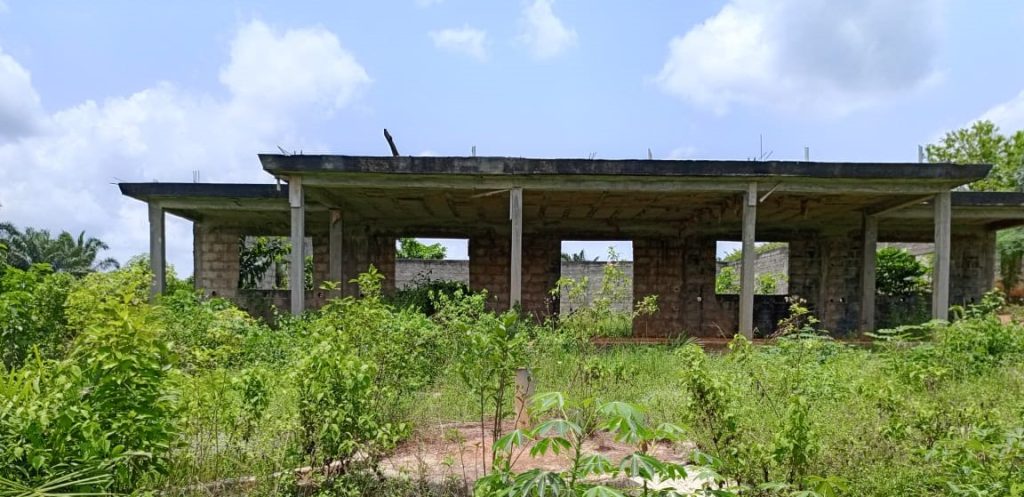The residents of Duncan Village Community in Bong County, Liberia, are grappling with the consequences of an abandoned town hall project initiated by Senator Prince K. Moye during his tenure as a Representative. Originally intended as a vocational training center for women, the unfinished structure has become a haven for criminal activity, disrupting the community’s peace and posing a safety risk to residents, particularly children. The community’s chairlady, Esther V. Sumo, expressed deep disappointment over the senator’s failure to complete the project, viewing it as a betrayal of the community’s trust and a denial of their right to equal opportunity. The situation is further compounded by the damage inflicted on the community’s sole hand pump by the construction crew, forcing residents to resort to unsafe water sources and jeopardizing their health.
The abandoned town hall project, initiated in 2016, aimed to empower women in Duncan Village through training in soap making, tie-dying, and other skills. However, the project stalled after reaching the roofing stage, leaving the structure incomplete and vulnerable to misuse. The community’s chairlady has repeatedly appealed for a resolution to the issue, emphasizing the growing security concerns and the hazardous environment the unfinished building creates. Children are particularly at risk, prompting warnings from community leaders to avoid the area. The stagnant water surrounding the unfinished structure has also become a breeding ground for mosquitoes, exacerbating health concerns within the community.
Adding to the community’s woes is the destruction of their only hand pump during the construction phase. This critical water source remains unrepaired, compelling residents to fetch water from contaminated sources, such as bushes and streams, leading to a rise in waterborne illnesses, particularly among children. The lack of access to clean water poses a significant threat to the health and wellbeing of the entire community, further highlighting the detrimental impact of the abandoned project. The community feels neglected and abandoned by their elected representative, who they believe has failed to address their urgent needs.
Ansu Saysay, the head of the construction firm contracted by the Liberia Agency for Community Empowerment (LACE) to undertake the project, confirmed that his company received only a partial payment of US$19,500 out of the total contract sum of US$115,000. He attributed the project’s abandonment to LACE’s failure to disburse the remaining funds. This financial impasse has left the project in limbo, with no clear indication of when or if it will be completed. The contractor’s statement highlights the bureaucratic hurdles and funding challenges that often plague development projects in the region, leaving communities to bear the brunt of unfinished initiatives.
Senator Moye, in response to the community’s grievances, attributed the project’s stagnation to LACE and the Weah administration, claiming that the agency has failed to allocate the necessary funds for completion. He emphasized that the project was initiated under the previous administration of Ellen Johnson Sirleaf and that he has consistently engaged with LACE since 2018 to secure the remaining funds, but to no avail. He further asserted that his personal town hall projects in other communities have been successfully completed, contrasting them with the stalled Duncan Village project, which he insists is under LACE’s purview. This deflection of responsibility onto the government agency further complicates the situation and leaves the community with little recourse.
The situation in Duncan Village underscores the challenges faced by communities in accessing essential infrastructure and services. The abandoned town hall project, initially conceived as a means of empowerment and development, has instead become a source of hardship and frustration for the residents. The lack of accountability and the bureaucratic hurdles involved in securing funding for such projects have left the community vulnerable and without essential amenities. The case of Duncan Village serves as a stark reminder of the importance of transparent governance, effective project management, and community engagement in ensuring that development initiatives truly benefit the intended beneficiaries. The community’s plight calls for immediate action from relevant authorities to address the pressing issues of security, access to clean water, and the completion of the abandoned town hall, restoring hope and opportunity to the residents of Duncan Village.


